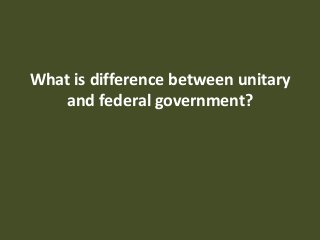
What is difference between unitary and federal government
- 1. What is difference between unitary and federal government?
- 2. • In a unitary government, the central government possesses much authority and decision-making power. Local governing bodies simply serve as administrative arms of the central government. Great Britain is a familiar example of a unitary government; individual British counties have little of the power commonly exercised by American states. France, with 90 departments grouped into 36 provinces, also has a unitary form of government. It is important, however, to note that unitary governments are not inherently less democratic than other forms. In a federal government, power is split between a central government authority and its constituent states. Usually, an overriding law of the land, known as a constitution, allocates duties, rights, and privileges to each level of government. The constitution usually defines how power is shared between national, state, and local governments; the power to amend this constitution is usually granted to the citizens or their governmental representatives.
- 3. • Unitary (France)--same laws throughout the country--the national government makes the rules. Confederate (the UN, CSA, pre-constitution USA)--a loose organization of smaller places (states) that make their own rules. The confederate country asks its states to work together, but lacks the power to make them. Federal (USA)--grants the national and state or local governments specific powers. They share power in certain defined ways. Presidential (USA)--the chief executive (president, the one who manages the country) is a separate elected official from the legislature. Parliamentary (UK, and most other republics)--the chief executive (prime minister) is chosen from the majority party from the legislature. If there is no majority party, a coalition is formed from the different parties to make a majority, and the coalition decides who the prime minister will be.
